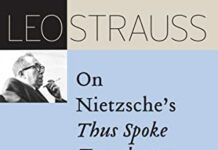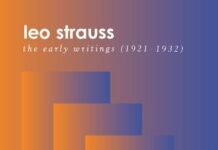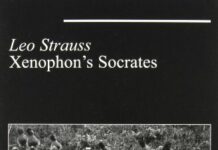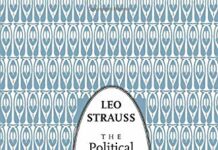
Ebook Info
- Published: 2013
- Number of pages: 208 pages
- Format: PDF
- File Size: 9.22 MB
- Authors: Leo Strauss
Description
The essays collected in Persecution and the Art of Writing all deal with one problem—the relation between philosophy and politics. Here, Strauss sets forth the thesis that many philosophers, especially political philosophers, have reacted to the threat of persecution by disguising their most controversial and heterodox ideas.
User’s Reviews
Reviews from Amazon users which were colected at the time this book was published on the website:
⭐I bought PERSECUTION AND THE ART OF WRITING because I wanted an easy approach to whatever contribution Leo Strauss might be able to make to the understanding of political philosophy, and the idea that writers might be persecuted is fundamental to my understanding of what separates social thinking from what a philosopher might be capable of. The second chapter, which covers the topic “Persecution and the art of writing,” is only from page 22 to page37 of this book. The Introduction attempts to provide a basis for understanding all the essays in this book “within the province of the sociology of knowledge.” (p. 7). The final chapter, “How to Study Spinoza’s THEOLOGICO-POLITICAL TREATISE,” is the culmination of a series of articles, which first appeared in 1941, 1943, and 1948, that is primarily concerned with understanding the works of a few philosophers in a manner which might be helpful “for a future sociology of philosophy.” (p. 7).The particular work of Spinoza discussed was an attempt “to refute the claims which had been raised on behalf of revelation throughout the ages.” (p. 142). Studying the Treatise is primarily philosophical because “the issue raised by the conflicting claims of philosophy and revelation is discussed in our time on a decidedly lower level than was almost customary in former ages.” (pp. 142-3). Later it is admitted that Spinoza’s own age did not have Spinoza’s books to discuss. “The only book which he published under his own name is devoted to the philosophy of Descartes.” (p. 152). “But Spinoza, who wrote for posterity rather than for his contemporaries, must have realized that the day would come when his own books would be old books.” (p. 153). My own understanding of Spinoza is not helped by the fact that the longest quotations, in note 2 on page 143 and note 19 on page 153, are in latin. Note 13 on page 149 quotes Carl Gebhardt (Spinoza. OPERA, vol. II, p. 317) in German. I thought I was going to be able to understand it best when Strauss wrote, “To ascertain how to read Spinoza, we shall do well to cast a glance at his rules for reading the Bible.” (p. 144). Philosophy itself might demand that the most modern conclusion on that effort would be: “For the same reason it is impossible to understand the Biblical authors as they understood themselves; every attempt to understand the Bible is of necessity an attempt to understand its authors better than they understood themselves.” (p. 148). In the case of the Bible, the idea of revelation offers the consolation to people who never wanted to be considered its authors that the book was written by someone else, as the angel who dictated the Koran to its prophet is the ultimate target of the book THE SATANIC VERSES by Salman Rushdie in the most modern comic edition of this conflict. The only escapes which Spinoza would offer is “to potential philosophers, i.e., to men who, at least in the early stages of their training, are deeply imbued with the vulgar prejudices: what Spinoza considers the basic prejudice of those potential philosophers whom he addresses in the Treatise, is merely a special form of the basic prejudice of the vulgar mind in general.” (p. 184). Given the facts of life for most people, this seems to be particularly bad news for the political, which could use a few intellectual connections.
⭐A lot of reviewers have focused on the discussion of Maimonides, but I was most engaged at the end with Spinoza.I’ll quote it at length-spoiler alert-While former generations publicly denounced Spinoza as an atheist, today it is almost a heresy to hint that, for all we knowprior to a fresh investigation of the whole issue, he may have been an atheist. This change is due not merely, as contemporaryself-complacency would have it, to the substitution of historical detachment for fanatical partisanship, but above all to the factthat the phenomenon and the causes of exotericism have almost completely been forgotten.To return to the Treatise, we are now in a position to state the true reasons for certain features of that work which have notyet been sufficiently clarified. The Treatise is addressed to Christians, not because Spinoza believed in the truth of Christianityor even the superiority of Christianity to Judaism, but because “ad captum vulgi loqui” means “ad captum hodierni vulgi loqui”or to accommodate oneself to the ruling opinions of one’s time, and Christianity, not Judaism, was literally ruling. Or, in otherwords, Spinoza desired to convert to philosophy “as many as possible,” and there were many more Christians in the worldthan there were Jews…at any rate, Spinoza was a “Christian with the Christians” in exactly the same way in which, accordingto him, Paul was “a Greek with the Greeks and a Jew with the Jews.” It is the political and social power of Christianity whichalso explains why the subject matter of the Treatise is Jewish rather than Christian. It was infinitely less dangerous to attackJudaism than to attack Christianity, and it was distinctly less dangerous to attack the Old Testament than the New. (p. 189-190)What’s fascinating is that Strauss himself is a philosopher who converted many Jews and Christians to his form of philosophy,a true reading of the ancients and moderns in many respects, and is believed to be an atheist. So when he’s writing aboutSpinoza, a lot of it applies to himself, but Strauss’ atheism was less hidden because presumably less dangerous in his time.But since Strauss must have used exoteric writing, what is it that he wasn’t able to state explicitly?
⭐Artfully presented. Definitely not in the pop-philosophy category. Rather: relevant, interesting, rigorous/stringent, concise. As a fellow student once remarked of something similar to this: encyclopedic context. I did first come across this long ago, not finishing it: I complained that it was so complex, an analysis would be nearly impossible. However, practice with logic and argumentation can work wonders. I think of the average four-year degree graduate at a philosophy program as an utter dilettante compared to people like Strauss. It is like being brought into a new world.
⭐Leo Strauss collects essays from a novel perspective in this volume. I bought this to read about his take on Maimonides, and esp. his Guide for the Perplexed. He supplies context and continues his work of explicating the complex thought f Maimonides as only he does.I like it.
⭐I bought this book based on the good reviews that I read here on Amazon. I like to say that I’m pretty reasonable, but when I tried to read it I found it incoherent. It’s incoherent. I expect that one needs to know the background that he talks in, since none of that is provided. In my opinion his style can be compared to the incoherent writings out of many continentalists, which is a comparative literature term that refers to smart people from Europe that talk a lot but don’t say anything specific – think of it as a sort of poetry of critical theory.
⭐impeccable
Keywords
Free Download Persecution and the Art of Writing in PDF format
Persecution and the Art of Writing PDF Free Download
Download Persecution and the Art of Writing 2013 PDF Free
Persecution and the Art of Writing 2013 PDF Free Download
Download Persecution and the Art of Writing PDF
Free Download Ebook Persecution and the Art of Writing





